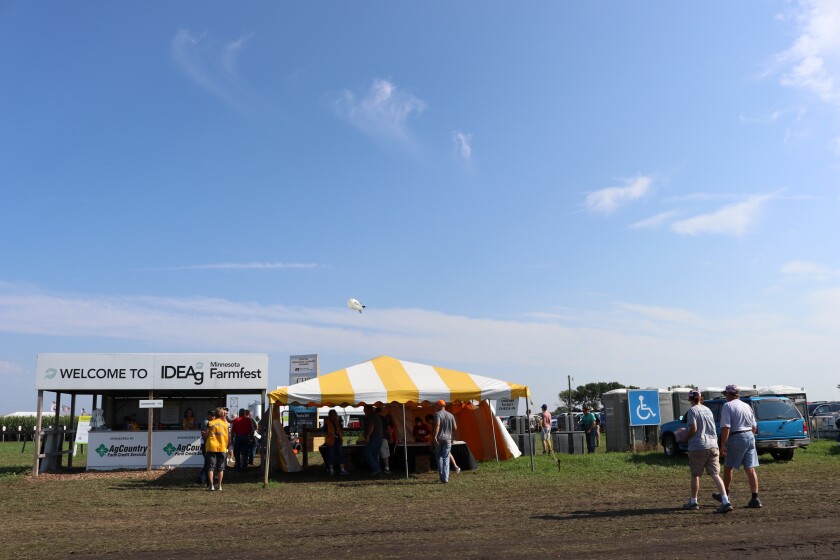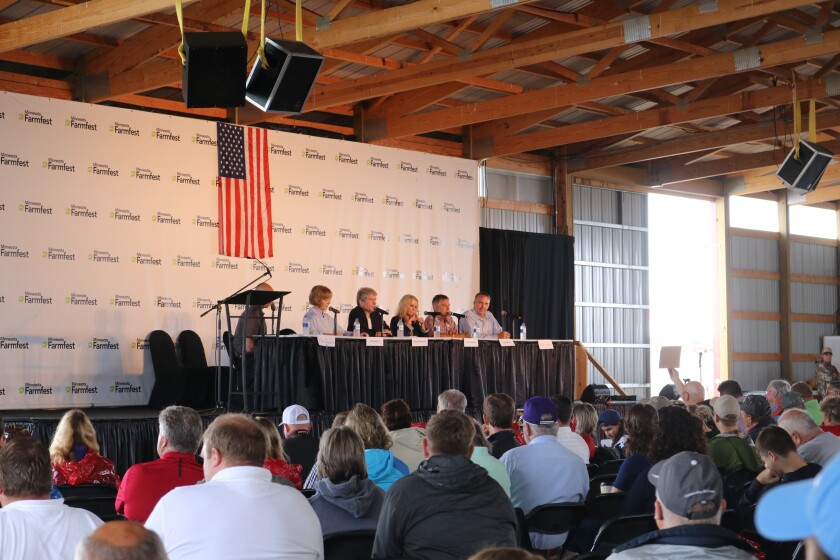REDWOOD FALLS, Minn. - The pouring rain on the first day of Minnesota Farmfest didn't keep people from pouring through the gates of the annual event that draws thousands to learn about what's new in agriculture.
John Hendel, director of event sales for Farmfest, said the event, in its 37th year, has been held for 25 years at the Gilfillan Estate near Redwood Falls, Minn.
ADVERTISEMENT
"It's a great location. We're in the heart of major agriculture here in the state of Minnesota," he said. "It's a great place to bring all this technology and all this innovation we have for Farmfest to farmers."
Changes in technology and innovation in agriculture give people reasons to keep coming back, he said.
"It's a great way to get together. It's a great way to meet your neighbor who may be down the road but you don't connect that often," he said.
Farmfest featured candidate forums in U.S. Senate races, Congressional races and the governor race. Questions probed candidates on issues on the minds of those in rural Minnesota, including concerns about the farm bill, health insurance, mental health, prices, trade agreements and tariffs.
Farmers and ranchers at Farmfest seemed mostly concerned with the last three items, worrying about the prices they're going to get for their crops and livestock, as well as what is happening on the international stage with trade and tariffs.
Andy Jahn of Carver, Minn., rents about 65 acres of hay land. He'd like to see more assistance for beginning farmers. He wishes the land transfer program in the state was more structured to have younger farmers take over for retiring farmers with mentorship from the older generation.
"There's hardly any promotions or anything to do with young farmers, or helping a young farmer get started, and that. If you're not a big corporation or a big farmer that's grown up in it, you're SOL," he said.
ADVERTISEMENT
The plight of young farmers also weighs on the mind of Charles Svoboda of Jackson, Minn. Svoboda, 75, farms 1,500 acres with his 77-year-old brother and his nephew. With grain prices low and landlords unlikely to drop cash rent due to rising real estate taxes, he doesn't know how some younger farmers can make it.
"There could be some farmers that'll have to quit farming because of financial situations," he said.
For Mike Schneider of Sacred Heart, Minn., the biggest concern for him is "probably profitability in the dairy industry."
Schneider has a 300 cow organic dairy and farms 1,100 acres of organic crops. While the price situation for an organic dairy is "probably better" than for conventional, Schneider said it's still rough competing against a product that is being sold under the cost of production. Schneider doesn't know the solution, whether it's a national supply management program or something else.
"I certainly don't have the answers, but we should be having a conversation," he said.
The low milk price also was on the mind of Sheila Thull of Freeport, Minn.
"And then the second is, of course, the health insurance issue," she said.
ADVERTISEMENT
She'd like to retire but can't afford health insurance if she does.
"We need to have lower costs for the health insurance. We need to have higher milk prices so we can pay the health insurance," she said.
Mike Solorz raises poultry and beef, along with corn and soybeans, in Bowlus, Minn. He sees ironing out trade problems as the best way to get prices back on track.
"Well the trade, the trade deal is just a terrible thing. It seems like every time they do something it's on the backs of the farmers," said Mike Solarz.
David Bergeson raises corn and soybeans in Dawson, Minn. He thinks improvements need to be made in the trade arena, but he doesn't want to see existing agreements go away entirely.
"I'd like to see people actually sit down at a table and have a decent discussion instead of throwing bombs across the table at each other," he said. "Which, as long as politics are involved that's not likely going to happen. But there needs to be some common sense brought back into things."
Dale Bullerman and his brothers have 5,000 acres and 10,000 sows in Adrian, Minn. They do some hedging on the futures market, which has protected them somewhat from the drop in prices. They're optimistic that things will work out, but they're also a little nervous.
ADVERTISEMENT
"We might have to take a beating for a little while," he said. "I'm hoping that they get that tariff straightened out, so it works both ways for all countries."













